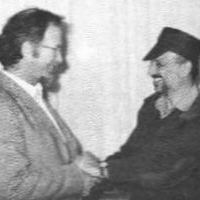![]()
Monday, February 22, 2016
This article is originally published by The Meir Amit Intelligence and Terrorism Information Center under the title “Intelligence and Decision Making: the IDF Leaving Lebanon as a Case Study”.
About the book
Brig. Gen. (ret.) Amos Gilboa’s book, The True Story of How Israel Left Lebanon (May 2000) Code Name “Dawn”, was published recently. The book deals with Israeli Prime Minister Ehud Barak’s decision to leave Lebanon and the way it was implemented. The author, Amos Gilboa, is a senior member of the Israeli intelligence community and former head of the Analysis Department of Israeli Military Intelligence. He is currently a research fellow at the Meir Amit Intelligence and Terrorism Information Center, inter alia. Gilboa wrote the book Master of Intelligence, a biography of General Aharon Yariv, former head of Israeli Military Intelligence.
The book discusses at length the relationship between Prime Minister and Defense Minister Ehud Barak and the IDF, thoroughly examining the role of Israeli Military Intelligence in decision-making (mainly during the period between February and May 2000, when the decision to leave Lebanon was formulated and the implementation of the decision was decided on). The book is based on a study which was written by Gilboa as part of the Methodological Studies series and approved for publication by the Israeli Military Censor. The study is part of a series carried out at the Intelligence & Policy Studies Institute within the ITIC examining the role of Israeli Military Intelligence at the important crossroads of decision in Israel’s history. These studies are carried out by experienced researchers with an extensive background in intelligence research coupled with an academic background.
Much has been written in Israel to date about leaving Lebanon, but this book is unique. This is the first time that the internal Israeli decision-making process that took place behind the scenes has been publicly described. The book is based on documents, transcripts, meeting summaries, personal diaries and letters. It is also based on a series of interviews that Gilboa conducted with the people who were involved in decision-making (including intelligence officials and IDF officers). They include individuals from the highest levels (dozens of hours of conversations with the then Prime Minister, Chief of Staff, Head of the IDF Northern Command and high-ranking military intelligence officers), through intermediate levels and the low “working levels”.
The book, written in Hebrew, is 192 pages long, in the form of a suspense drama. It includes statements and dialogues that rely in part on transcripts and meeting summaries. Some of them are reconstructions made by Gilboa for illustrative purposes. At the end of the book, Gilboa presents a summary including key insights from the IDF leaving Lebanon.

The cover of Amos Gilboa’s book: The True Story of How Israel Left Lebanon (May 2000) Code Name “Dawn”
The role of Israeli Military Intelligence in the decision-making process on leaving Lebanon
In the concluding section of the book, Gilboa briefly analyzes several aspects of the decision-making process on leaving Lebanon: the actual decision; how the decision-making process was conducted and implemented; the act of leaving Lebanon; the relationship between the political and military echelons; the role of Israeli Military Intelligence in the decision-making process; the policy towards the South Lebanese Army (SLA) and the issue of deterrence. Of all these insights, in this bulletin we have chosen to present the key insights about the role of Israeli intelligence in the decision-making process.
The most striking insight arising from the book is that Prime Minister Ehud Barak made his fundamental decisions without consulting the Israeli intelligence (not for the first time in Israel’s history…). In this context, the book states that Military Intelligence was completely absent (as was the IDF) from the Prime Minister’s “planning group” in advance of the government’s sole decision to leave Lebanon (March 5, 2000). It is a historical irony that the decision to enter Lebanon in 1982, including the policy perceptions involved, was also made by the senior political echelon (Prime Minister Menachem Begin and Defense Minister Ariel Sharon) without taking Military Intelligence’s assessments into consideration[1].
Amos Gilboa’s study found that the first assessment by Israeli Military Intelligence on leaving Lebanon without an agreement was written only after Prime Minister Ehud Barak had made the decision to do so. According to the book, like the IDF itself, Military Intelligence always found itself one step behind the decisions made by Prime Minister Ehud Barak. Military Intelligence, Gilboa writes, “constantly remained ‘blind’ to the Prime Minister’s actual intentions about the political talks that he conducted and about the [relevant] intelligence that he needed.”
In his book, Gilboa tries to explain the causes and roots of this phenomenon.From Barak’s perspective, Gilboa notes, he did not need intelligence where security threats were involved. As a former chief of staff, he understood them well and had no need to hear them from Military Intelligence. However, he required vital intelligence of a different nature. The core of Ehud Barak’s plan was synchronization between two tracks: starting a political process based on UN Security Council Resolution 425[2] while holding on to the security zone (preventing its collapse) until the completion of the political process. Thus the main relevant intelligence that Barak needed was the condition and stamina of the SLA, and attitude of the relevant international agencies with regard to the realization of Resolution 425, including the delineation of the border behind which the IDF would redeploy.
On both of these issues, believes Gilboa, the contribution of Military Intelligence was secondary, and for good reason: Military Intelligence did not deal with the SLA (because Military Intelligence is accustomed to dealing with the enemy and not with the IDF or its affiliated forces); and, at the political level, the reports from Military Intelligence arrived after Barak had obtained the relevant information from channels of his own. Handling both these issues was assigned to the Office of the Coordinator of Israel’s Activities in Lebanon, headed by Uri Lubrani, which operated as part of the defense minister’s bureau. The staff at the bureau consisted of former members of the intelligence community who had served in Lebanon. They had extensive and longstanding ties with both the SLA and the international agencies relevant to the implementation of Resolution 425 (including the US Embassy in Israel, UN officials, and the Red Cross).
Lessons and Insights
In Gilboa’s opinion, the main lesson regarding the relevance of the intelligence to the decision to leave Lebanon is as follows: when the main problem faced by the political leadership is the “enemy” and its inherent military threat, intelligence plays a key role (as exemplified in the central role played by Military Intelligence in the Six Day War and the Yom Kippur War). However, when the IDF left Lebanon, as well as when it entered the country, the enemy was terrorist organizations rather than standing armies (Palestinian terrorist organizations when the IDF entered Lebanon, and Hezbollah when it left). Under such circumstances, the main problem faced by the Israeli leadership is primarily at the political, diplomatic and international domain, where intelligence does not play a central role.
However, Gilboa continues, even if Barak was able to make his strategic decisions without intelligence assessments, he was dependent on Military Intelligence with regard to two issues that were relevant to decision-making: targets for attack and warnings of terrorist attacks. In these areas, the political leadership is “blind” without intelligence. In his book, Gilboa examines the Military Intelligence assessments on these issues, based on original documents, and raises the question: “Now, with the wisdom of hindsight, what can we say about the assessments of Military Intelligence?” (From the perspective of the present, 15 years after leaving Lebanon). Gilboa’s answer is complex:
- On the one hand, Military Intelligence correctly assessed a wide range of key issues: the establishment of Hezbollah’s deterrent force after Israel left Lebanon; Hezbollah’s complete takeover of southern Lebanon; the eastern sector of south Lebanon (Shebaa Farms) becoming a “legitimate” target for terrorist attacks against Israel from Hezbollah’s perspective; and the inspiration that leaving Lebanon could provide to Palestinian violence in the Territories.
- On the other hand, Gilboa believes that the assessment by Military Intelligence somewhat exaggerated the threats and risks facing the IDF and the communities on Israel’s northern border on the part of Hezbollah (although it certainly did not terrify the decision-makers, as was claimed tendentiously in the Israeli media by politicians in the period prior to leaving Lebanon). In addition, the assessment by Military Intelligence ignored the SLA (which was not under its jurisdiction) and also downplayed the weight of the factors that could have restrained the use of terrorism by Hezbollah after the IDF had left Lebanon (particularly the international legitimacy on the basis of UN Security Council Resolution 425).
Gilboa sums up the insights pertaining to intelligence, saying: “There is no doubt that the primary function of intelligence is to point out the risks. This is its duty, and it did so. The problem with the assessments by Military Intelligence was that they failed to point out the prospects. The music of Military Intelligence has always been the music of military marches. Is this due, in part, to the fact that Military Intelligence, as the Israeli national estimator, is part of the IDF and not part of the civilian system? I’m not sure. Why? Because a perusal of the documents of the Mossad on leaving Lebanon (and its role here was totally negligible) shows that, despite being a civilian institution, its assessment also suffered from exaggeration and, in any event, did not provide [Ehud] Barak with any new insights.”
Are these insights concerning the role of intelligence in decision-making, relevant to the specific event of the IDF leaving Lebanon, or are they the symptoms of a more widespread phenomenon? The series of studies, of which Gilboa’s book is part, will discuss additional cardinal decisions concerning Israeli national security since the establishment of the State of Israel, and will attempt to answer this question.
![]()
Notes:
[1] On this subject, see the Hebrew article by Dr. (Col., Ret.) Reuven Erlich: The First Lebanon War: What were the goals of the war and what was the influence of intelligence on the decisions that led to the war?” The article was written based on a lecture given by Dr. Erlich on January 13, 2015, at a seminar held by the Intelligence & Policy Studies Institute at the IICC.
[2] In his book, Gilboa describes in great detail the process by which Prime Minister Barak adopted UN Security Council Resolution 425 from 1978 in order to gain international legitimacy for leaving Lebanon.



 RSS
RSS










Latest Comments
Hello Mike, Thank you for your positive feedback to the article. I felt there wasn’t too much critical analysis of ...
Thanks for this considered and well constructed article. A follow up article on the manner in which the editorial contro...
THE CLUELESSNESS OF CLAIMING THAT OBAMA'S MIDDLE EAST POLICIES WERE A FAILURE CANNOT BE FURTHER FROM THE TRUTH, WHAT THE...
As long as Obama is the president of the usa do not trust the us government......
Thank you for an good read....